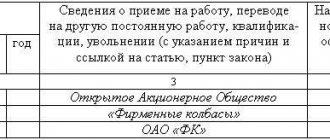When hiring a new employee, the employer always stipulates the range of duties that he will have to perform, in other words, his job function. This promotes certainty and stability in labor relations. The employee knows all his duties and bears some responsibility for their implementation.
However, there are cases when, for one reason or another (organizational or economic), there is a need to formalize a change in the labor function. In this situation, it is important to comply with all legal requirements and document the process at the proper level. In the article we will discuss the professional standard, the labor function, as well as documentary support for its change.
Labor function: concept
This concept is legally enshrined in Article 57 of the Labor Code of the Russian Federation. Within the meaning of this legal norm, a labor function should be understood as work in a specific position in accordance with the staffing table, profession and specialty with a mandatory indication of qualifications, as well as the type of specific activity that is entrusted to the employee. Thus, the concept has two interpretation options according to the Labor Code of the Russian Federation.
The labor function is what is enshrined in the employment contract. The wording in it will depend on which interpretation of the concept you choose in each specific situation. So, in the first option, a clause must be included in the employment contract, for example, with the following content: “The employee undertakes to perform work in the position of a chief specialist (chief accountant, leading legal adviser, etc.).” The specific job duties that the newly hired employee will perform are the basis for creating a job description.
If the function of work activity is interpreted according to the second option, then the entry in the employment contract also changes. For example, it may sound like this: “This employee is entrusted with performing plumbing (installation, unloading and loading, etc.) work.
Experts are of the opinion that, within the meaning of Article 15, Part 2 of Art. 57 of the Labor Code of the Russian Federation, the concepts of “position title” and “labor function” are not identical in content. In fact, the second is one of the characteristics of the first. The labor function is specified by certain job responsibilities.
https://youtu.be/DfdqmqkD1cw
PRESIDIUM OF THE SUPREME COURT OF THE RF REFUSES THE CLAIM
The Presidium of the Supreme Court of the Russian Federation, by a resolution dated 06/08/2011, found the resolution of the Presidium of the Moscow City Court and the ruling of the Judicial Collegium for Civil Cases of the Supreme Court of the Russian Federation subject to cancellation on the following grounds.
The resolution dated 06/08/2011 states that, when deciding to refuse to satisfy the stated requirements, having assessed the evidence collected in the case in accordance with Art. 67 of the Code of Civil Procedure of the Russian Federation, the court of first instance proceeded from the fact that K.’s labor function was not changed, since she was asked to continue working as the head of another structural unit of OJSC “B.” in the same specialty, qualifications, but with a change in the essential terms of the contract (reducing the amount of remuneration), in connection with which K.’s dismissal on the basis provided for in paragraph 7 of part 1 of Art. 77 of the Labor Code of the Russian Federation, was carried out by the defendant correctly and in compliance with the procedure established by law. The Judicial Collegium for Civil Cases of the Moscow City Court agreed with the conclusions of the trial court.
The Presidium of the Moscow City Court, canceling the judicial acts that took place in the case and entered into legal force, did not indicate what the significant violation of the rules of substantive or procedural law was committed by these courts and served as the basis for the cancellation, did not provide relevant arguments to justify the need to make a decision about their abolition and limited himself to only referring to the provisions of Art. 721 and 74 of the Labor Code of the Russian Federation and the conclusion that in reality there was not a change in the terms of the employment contract determined by the parties, but a change in the plaintiff’s labor function, namely a transfer to another job without her written consent.
The Presidium of the Supreme Court of the Russian Federation came to the conclusion that the above argument contradicts the content of Part 2 of Art. 57 of the Labor Code of the Russian Federation, according to which the labor function is also one of the mandatory conditions of the employment contract, determined by the parties.
In accordance with Art. 15 and 57 of the Labor Code of the Russian Federation, the labor function is understood as working in a position in accordance with the staffing table, profession, specialty, indicating qualifications; the specific type of work assigned to the employee.
According to Part 1 of Art. 721 of the Labor Code of the Russian Federation, transfer to another job is a permanent or temporary change in the labor function of an employee or structural unit (if the structural unit was specified in the employment contract) while continuing to work for the same employer, as well as transfer to work in another location together with the employer. Transfer to another job is permitted only with the written consent of the employee, except for the cases provided for in Parts 2 and 3 of Art. 722 Labor Code of the Russian Federation.
Since the defendant reorganized its divisions on the basis of Art. 74 of the Labor Code of the Russian Federation, such employee consent was not required. In other words, the Presidium of the Supreme Court came to the conclusion that OJSC “B.” should reorganize its structural divisions. had the opportunity independently, without asking the plaintiff’s consent.
The Meshchansky District Court of Moscow and the Judicial Collegium for Civil Cases of the Moscow City Court, together with other evidence collected in the case, assessed the content of the notice of OJSC “B.” dated 06/04/2009 to K. as an offer of employment in accordance with the execution procedure of OJSC “B.” requirements of Art. 74 of the Labor Code of the Russian Federation, and not as an individual transfer without connection with a change in organizational working conditions.
The validity of this conclusion is confirmed by the absence in the case materials of an order to transfer the plaintiff to the position of head of the Information and Analytical Department of OJSC "B." During the trial, K. did not refer to the existence of such an order.
In connection with the above, the decision of the Presidium of the Moscow City Court dated November 26, 2010 and the ruling of the Judicial Collegium for Civil Cases of the Supreme Court of the Russian Federation dated April 22, 2011 were cancelled, the decision of the Meshchansky District Court of Moscow dated December 15, 2009 and the ruling of the Judicial Collegium for Civil Cases of the Moscow city court dated July 15, 2010 were upheld.
Documentation of the labor function
It has already been said above that the labor function of an employee is work according to the position in accordance with the staffing table, profession and specialty. In this case, the qualifications and the specific type of work assigned to the new employee are separately indicated.
Analyzing this definition, we can conclude that the labor function should be documented. First of all, this is done in the staffing table, which indicates the profession and position. In addition, it is specified in the text of the concluded employment contract.
By signing it, the employee thereby expresses his consent to the specified labor function that the employer plans to assign to him. In order to change it in the future, mutual consent of both parties will be required. Even in the event of a change in technological or organizational conditions, labor legislation does not allow changes in the function of work activity only at the request of the employer, i.e. unilaterally.
As a rule, the scope of an employment contract is limited and does not allow describing in detail all the employee’s responsibilities related to a particular profession or position. In this case, a job description comes to the aid of the employer, which can be issued in the form of an appendix or a separate local regulation.
Not long ago, amendments were made to labor legislation regarding the so-called Professional Standard. It is understood as a characteristic of the qualifications that an employee requires to carry out professional activities of any particular type, including to perform any specific job function. Professional standards have been developed and applied in practice only in accordance with Articles 195.2, 195.3 of the Labor Code of the Russian Federation.
What is an effective contract?
The Government of the Russian Federation issued an Order containing a program for improving conditions relating to remuneration. It reveals the concept of an effective contract. In essence, this is the same classic (employment) contract with an employee, but it details not only the terms of payment and job responsibilities, but also performance indicators, as well as criteria for assessing its effectiveness, which later form the basis for calculating incentive payments , social support measures. That is, the salary depends directly on the results of work and the quality of municipal (state) services provided by the employee.
So, an effective contract is a formalized employment relationship based on:
- the presence in the institution of a task (state or municipal) and target indicators characterizing the effectiveness of activities (they are approved by its founder);
- a system for assessing the effective performance by an employee of his labor function (actions), which consists of a set of indicators and criteria approved by the employer in the manner prescribed by law;
- a remuneration system that takes into account differences in the complexity of the work performed by employees, as well as the quality and quantity of labor expended (it must be approved in the prescribed manner by the employer);
- labor standardization system approved in accordance with the established procedure by the employer;
- detailed specification of the types of labor functions, taking into account the specifics inherent in each individual industry, in employment contracts and job responsibilities, criteria and indicators that allow assessing the effectiveness of labor, as well as the terms of its payment.
At the moment, some areas of activity have already developed their own methodological basis for the gradual introduction of an effective contract into practice: medical and educational institutions, the sphere of culture and social services.
Drawing up an employment contract: how to use the professional standard?
It doesn’t matter what you choose - an employment contract in its classic version or an effective contract - in any case, it specifies the employee’s labor functions - this is not a wish, but a necessity. To do everything right, you should be guided by professional standards.
It is considered a mistake to indicate only the position in the employment contract, because it is not a labor function. The Labor Code of the Russian Federation in Article 57 regulates its content. It is separately emphasized that it is necessary to reflect in the text “work according to the position”, and not just its title. Often, employers violate the Labor Code of the Russian Federation, not suspecting that the fine for this offense can be a very significant amount - from 50 to 100 thousand rubles. Moreover, they can be summed up if the inspector finds a violation in several employment contracts.
So, according to the Labor Code of the Russian Federation, the labor function must be prescribed, but how to do this correctly? By simply rewriting a job description into a standard employment contract, the employer is essentially tying his own hands. Professional standards are designed to help in this matter.
The need for a job description
Russian legislation does not stipulate the need for job descriptions in every company. An employer with any organizational form has the right to accept such a document, but is not obliged to do so. It is considered to be a handy tool that can be used for the following purposes:
- Clear regulation of obligations between the parties; already at the interview stage, the candidate can familiarize himself with the list of tasks assigned to him.
- Detailing the activities of employees, as well as establishing the boundaries of authority.
- A general guideline for resolving disputes between superiors and subordinates.
- Assessment of personnel by third-party structures for professional compliance.
In general, the entire list of responsibilities can be fixed in the contract. But a well-written job description is a way to unify the work system at the enterprise. Typically, the document includes the following sections:
- responsibilities - direct tasks that are assigned to an employee in a specific position; education in most cases does not play a role;
- rights – a list of the employee’s powers (there is no need to rewrite the general rights of employees);
- responsibility is not always a used section, but some managers include information about possible sanctions for failure to complete tasks;
- interaction - a description of the principles and rules of communication between an employee and his superiors, subordinates, other departments, and so on.
In most cases, the job description is included in the agreement as an annex, but an integral part. A reference must be made in the document. It is believed that as soon as the specialist has signed the contract, he has agreed to the addition.
Contract – separately, job description – separately
You can often encounter a situation where an employee’s job description is simply rewritten into an employment contract. The employer is reinsured and complies with Art. 57 of labor legislation, but this is not entirely correct.
With this approach, the instruction is part of the employment contract, which means that changes to it can only be made with the consent of the employee (it is given in writing), since they will directly relate to a change in the labor function - this is confirmed by Article 74 of the Labor Code of the Russian Federation. When an employee does not agree, nothing can be changed and it is also not possible to fire him.
In order to reserve the opportunity to make adjustments to the employee’s duties and at the same time comply with the requirements of labor legislation, the employer can reflect in the contract only general labor functions, which can be found in the professional standard. They are indicated depending on the level of qualification of the specialist. But in the job description, drawn up in a separate document, the employer already indicates the algorithm of actions for a specific employee.
How to distinguish a function from an action? It's actually simple. A labor function is a task, and actions are specific operations, which together constitute an algorithm for its implementation.
How to correctly change an employee's job description
Changes to the job description may be associated with changes in the terms of the employment contract. In this case, the requirements for advance written notification of this to the employee must be met. And only after the employee has agreed to continue the employment relationship, the job description changes:
- if the instruction is an annex to the employment contract, it is advisable to simultaneously make changes to the employment contract and job description by preparing an additional agreement;
- if the job description was approved as a separate document and changes to it do not entail the need to change the terms of the employment contract, it is most convenient to approve the job description in the new edition by familiarizing the employee with it in writing (letter of Rostrud dated October 31, 2007 No. 4412-b ).
The absence of vacant positions or the employee’s refusal of an offered job may serve as grounds for termination of the employment contract in accordance with clause 7 of Part 1 of Art. 77 Labor Code of the Russian Federation. In this case, there is no need to obtain a reasoned opinion from a representative body of employees.
When dismissing employees on this basis, the employer must pay them, in addition to the final payment and compensation for unused vacation, severance pay in the amount of two weeks' average earnings (Part 3 of Article 178 of the Labor Code of the Russian Federation).
If organizational or technological changes may lead to massive layoffs, Art. 74 of the Labor Code of the Russian Federation gives the employer the right to unilaterally introduce a part-time working regime. When introducing such a regime, the opinion of the trade union must be taken into account. Criteria for mass layoffs are set by industry agreements and generally depend on the timing of the release of workers and the percentage of the total number of workers.
It is important to take into account that Art. 74 of the Labor Code of the Russian Federation provides for the right, and not the obligation, of the employer to dismiss under clause 7 of part 1 of Art. 77 of the Labor Code of the Russian Federation for an employee who does not agree to work in new, changed conditions. Even if a specialist does not agree to work under new conditions, the employer has the right to keep him at work. However, this employee must work under the same conditions, and the employer is obliged to provide such working conditions.
Transformation of the employment contract
The general procedure for amending employment contracts is established by Article 74 of the labor legislation. At the initiative of the employer (in other words, unilaterally), this can happen in the event of a change in working conditions of an organizational and technological nature. It is this provision that should be followed when implementing an effective contract.
When introduced, key changes will affect the terms of the employment contract relating to remuneration and employee responsibilities. In this case, the employer is obliged to indicate the reasons for the adjustment and justify them as inevitable. It is necessary to refer to changes in the conditions regarding remuneration and the Program approved by the Government of the Russian Federation, which established clear criteria and performance indicators.
How to properly fire an employee if he does not agree to change working conditions
- changing the job description (at the initiative of the employer), familiarizing the employee with it;
- publication and signing of an additional agreement, which includes information about the updated conditions (this may be the place of work, the amount of wages, the term and start of the contract, the nature of the work).
More to read: The cost of living in Russia for 2020
Based on Art. 127 of the Labor Code of the Russian Federation, when terminating an employment contract, the employer pays the employee monetary compensation for all unused vacations. In addition, he must be paid severance pay equal to two weeks’ average earnings (Part 3 of Article 178 of the Labor Code of the Russian Federation).
How to change a job description?
Can an employer change his job description without the employee’s consent? The answer is yes. It is a local normative act. It is not the employee’s labor function that is subject to adjustment, but his actions. The Labor Code of the Russian Federation does not prohibit this. In this case, there is no need to notify the employee 2 months in advance and obtain his consent to this procedure. It is enough just to familiarize him with the updated job description. However, it is important to remember that when adding new labor actions to it, it is necessary to ensure that they do not contradict and comply with the general labor functions specified in the contract. In practice, it often happens when, for example, a cleaner is given the duties of a janitor, as they say, “as a burden.” In this form, this situation is unacceptable.
If an employer wants to assign any new job functions to an employee that are not part of his professional standard, this will have to be done in a different way. The algorithm of actions is as follows. First, with the consent of the employee, he adds a general labor function from the second professional standard to the employment contract, and only then begins to develop a new job description. In this case, the employee will already have to meet the requirements of two professional standards.
The legislation allows for changes in the labor function; this right of the employer and employee is enshrined in Article 72 of the Labor Code of the Russian Federation. This action is formalized by transfer to another job, and it can be either temporary or permanent.
Establishing the fact of labor relations
From the explanations of the defendant’s representative it follows that the above domain name was transferred by him for use to third parties in accordance with the legislation of the Russian Federation. Also, the magazine No. (...) submitted by her for November 2009 of “Sapsan Holding”, a project in which in the appointment section for September her name is indicated as an employee hired for the position of designer, cannot be evidence that allows the court to satisfy the plaintiff’s claims. photographer in the advertising department in the sales and advertising department. The claim was denied. As in the previous example, here we can cite a court decision in which the claim was satisfied precisely on the basis that the employee was issued a pass to the employer’s territory, although with the caveat that the pass was issued specifically to enter the defendant’s territory. This decision was made by the Pervomaisky District Court of the city of Omsk in case No. 2-2266/2012 dated 08/13/2012.
That is, the employer in the new instructions only generalized the labor actions previously charged to the plaintiff, and the plaintiff incorrectly perceived this wording as a new duty (function) (appeal ruling of the Rostov Regional Court dated May 26, 2016 in case No. 33-8683/2016). Now we will give examples where the court agreed with the employees and came to the conclusion that a change in the job description led to a change in the mandatory terms of the employment contract. Arbitrage practice. The employer changed the engineer's job description, adding blue-collar responsibilities.
The court saw this as a significant change in job duties in circumvention of Art. 72 of the Labor Code of the Russian Federation: in fact, the plaintiff was transferred to another job. In this connection, the order to introduce a new job description was subject to cancellation (decision of the Moscow City Court dated February 10, 2012 in case No. 33-3987). Arbitrage practice.
Change of work function for a while
The work function can be changed for a certain period of time. Thus, Article 72.2 of the labor legislation establishes that an employee can be transferred for a period of up to one year, or until the absent employee returns to another job.
In this case, mutual written consent to change the job function is required. There may not be any (additional) training for the new position. In any case, all aspects of such a translation are negotiated by the parties, and their consent is always required. The exception is situations where there has been an industrial accident, man-made or natural disaster and other exceptional cases that put the life and health of the population at risk. In this situation, a transfer can be completed without the employee’s consent, but the period should not exceed one month.
Changing the employee’s job function on a permanent basis
Not a temporary, but a permanent change in the job function is also possible and can be caused by various kinds of circumstances: the initiative of the employee or employer, other objective reasons. Partly the same principles apply as in the previous case.
If the employer initiates a permanent transfer, he will have to obtain the employee’s consent. Registration is carried out according to Article 72.1 of the Labor Code of the Russian Federation. The exception is emergency situations.
The initiative can also come from the employee; moreover, in certain cases he can demand a transfer, then the parties must document this.
In addition, a change in labor function in this form may be caused by such an objective factor as a medical report. In all of the above cases, changes must be made to the employment contract.
What is the labor function of an employee? These are his job responsibilities
The labor function of an employee is his job responsibilities. However, this concept has a variety of variations. Diversity is determined by the fact that the relationship between employee and employer is a process of adjusting the interests of four parties at once. These parties include: employer, employee, organization and team. Ideally, the interests of these parties should coincide, but they usually do not coincide, since they always consist of people defending their interests within the niche of a given system.
It would seem that the employer in this connection is the enterprise. He must act within the law and in the interests of the enterprise. However, the employer cannot be identified with the enterprise. An enterprise is an impersonal system consisting of processes, mechanisms and functions. The system, of course, is created and maintained by people, but this does not mean that the employer is the system.
Does the transfer formalize the renaming of a position?
In practice, you can often encounter a situation where, for one reason or another, the title of a position changes. For example, there was an “OT engineer”, but became an “OT specialist” or “forwarding driver” - just “driver”.
As a rule, not only the title of the position is changed, but also the range of job responsibilities along the way. In this case, we are talking about the transfer of an employee.
If there is a change in position without changing the job function, the transfer to another job is not formalized. Nevertheless, even partial renaming should be regarded as an adjustment to the employment contract. Therefore, it is important to document everything. First of all, changes are made to the existing staffing table, then to the employment contract with the employee and his work book.
How to define a labor function in an employment contract - sample and practical advice
Determining an employee’s job function is an extremely important task for every employer or personnel specialist. This is primarily due to the fact that most of the standards of current labor legislation require the fulfillment of a number of requirements that are directly related to the employee’s function defined in the employment contract. In particular, these include the following features of the legal regulation of labor relations:
Articles on the topic (click to view)
- What to do if the employer does not give the employment contract
- What is the difference between a collective agreement and an employment contract?
- Apprenticeship contract with an enterprise employee: sample 2020
- Terms of remuneration in an employment contract: sample 2020
- Go on maternity leave from the labor exchange
- Notice of extension of a fixed-term employment contract: sample 2020
- Notice of termination of a fixed-term employment contract: sample 2020
Working with personal data . The employer is strictly limited in its ability to process and request the employee’s personal data if it is not related to the performance of his job function.
- Changes in working conditions. The employer does not have the right to independently change the employee’s job function. He can ensure his temporary transfer to another job or permanent transfer - within the same territory and one labor function, if necessary. However, the employer does not have the right to change the job function on a permanent basis without the employee’s consent.
- Responsibilities of the worker. The main responsibility of an employee is the performance of his job function, and the employer cannot involve him in solving tasks that are not initially included in it, and the employee, accordingly, cannot be held responsible for failure to comply with such orders.
Accordingly, the employer should define the employee’s job function as specifically as possible. At the same time, the legislation does not oblige the full list of practical job responsibilities of the employee to be mentioned in the labor function. They may be regulated by other official documents. Therefore, the labor function can also determine simply the main area of activity. For example, a sample labor function in an employment contract may look extremely laconic:
Carrying out construction, welding and installation work.
For some professions and jobs, the law imposes special requirements. In addition, the activities of many workers may be regulated by separate professional standards or qualification reference books, which define professions specifically according to their labor function. And if the legislation provides for certain benefits for performers of certain labor functions, the employer is obliged to provide them.
Is it necessary to bring the job title in accordance with the professional standard?
There is no direct indication that it is the employer's responsibility to rename all existing positions in its staffing table in accordance with appropriate professional standards. However, if the organization plans to implement them one way or another, it would be advisable to do so. It is necessary to issue an order of appropriate content. All employees who are directly affected by them should be made aware of the upcoming changes. Please note that the law does not oblige the employer to immediately implement professional standards for all employees. The transition can be planned or gradual.
Title and renaming of the position
It is usually not only the job title that changes, but also the list of responsibilities. If the job adjustment takes place without changing the job function, then you should not formalize a transfer to another job. But even a partial renaming is already an adjustment to the TD. This means everything should be documented.
If the organization has plans to introduce professional standards, then it is necessary to issue an order that positions will be renamed in connection with the requirements of professional standards. And these changes are a reason to familiarize all employees affected by them with them. But according to the law, the employer does not have to introduce professional standards to all employees at once; this process can be smooth.
All questions, clarifications, nuances, and most importantly, correct and accurate documentation can be drawn up with our help. Contact NETEEL LLC, and you won’t have to be afraid of inspections, everything will be done correctly and according to the letter of the law!









